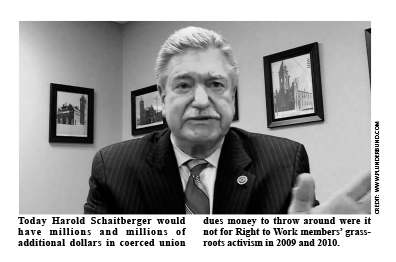Will Team Biden Weaponize Workers’ Pensions?
Big Labor abuse of worker pension and benefit funds as a means of advancing union bosses’ self-aggrandizing policy objectives is a familiar phenomenon.
(source: National Right to Work December 2015 Newsletter)
In the October 18 edition of the New York Times, a story by labor reporter Noam Scheiber described the bizarre and unconscionable International Association of Fire Fighters (IAFF) policy for doling out so-called “per diems” to union officials.
As many Newsletter readers undoubtedly know from personal experience, “per diem” allocations are a means employers use to compensate employees for their dining, hotel, and other expenses when their work requires them to travel out of town.
 But IAFF kingpins can collect up to $80 in “per diem” money on days when they remain in their city of residence, as long as they leave their homes.
But IAFF kingpins can collect up to $80 in “per diem” money on days when they remain in their city of residence, as long as they leave their homes.
Consequently, in FY 2014 four union vice presidents raked in at least $18,000 in per diem payments on top of their already-hefty salaries and benefits, and seven more grabbed at least $11,000 in per diems.
Sanctioning Misuse of Workers’ Dues Money Part Of ‘Management Strategy’
Citing a review of paperwork submitted by IAFF union vice presidents regarding their FY 2014 activities and forced dues-financed compensation, Mr. Scheiber observed: “[S]everal of them received the full $80 on dozens of days — in some cases well over 100 — in which they reported that they remained in their city of residence.”
When questioned by Mr. Scheiber about this flagrant abuse of firefighters’ forced dues and fees, Mr. Schaitberger claimed per diems for any union boss who has “left his house” are permitted under the IAFF’s official guidelines for claiming expenses.
The IAFF chief is apparently untroubled by the fact that a U.S. Labor Department official who performed a review of the union’s expense policies in 2009 reached the opposite conclusion.
Of course, enabling his lieutenants to rip off the rank and file by collecting phony “per diems” and in an array of other ways has helped Mr. Schaitberger consolidate his power to such a degree that he has, in Mr. Scheiber’s words, “enormous leeway in running the union.”
Regarding the 15-year IAFF union general president’s management approach, the reporter quoted Eric Lamar, a former firefighter and aide to Mr. Schaitberger who has become a scathing critic: “He will bully when he can, and buy support when he can’t.”
In 2009-2010, Right to Work Stopped IAFF Czar From Amassing Even More Power
Today Mr. Schaitberger would have millions and millions of additional dollars in coerced dues money to throw around if the IAFF hierarchy’s top priority in the 2009-2010 Congress had been adopted.
The so-called “Public Safety Employer-Employee Cooperation Act (S.3991) would have denied localities in all 50 states the option to refuse to grant a single public-safety union the power to speak for all employees, including those who don’t want to join, in talks with their employer regarding working conditions.
Monopoly bargaining, euphemistically labeled as “exclusive representation,” would have been foisted on firefighters, police, and other public-safety employees nationwide. And in most states that already authorize public-safety monopoly bargaining, S.3991 would have widened its scope.
But despite enjoying the enthusiastic support of the Obama White House, the then-Democrat majority caucuses in both chambers of Congress, and half-a-dozen GOP senators who were sponsors of another nearly identical measure, S.3991 never became law.
“The primary reason for the scheme’s failure was the persistent and passionate opposition of well-mobilized National Right to Work Committee members,” recalled Committee Vice President Matthew Leen.
“Time and again, they flooded Capitol Hill with postcards, petitions, e-mails, faxes and phone calls calling on Congress not to federalize public-safety monopoly bargaining.”
‘There Is No Way to Sugarcoat the Significance of This Loss’
The Committee had to fight this battle with very few active allies, although some groups representing the interests of local governments, such as the National Sheriffs’ Association, joined with the Committee in lobbying against S.3991.
When the 2009-2010 Congress finally adjourned without okaying his #1 legislative objective, Mr. Schaitberger lamented: “There is no way to sugarcoat the significance of this loss.”
What the October 18 Times article underscores is the enormous service Committee members performed for countless independent-minded firefighters in multiple states who remain free of IAFF monopoly control today as a consequence of the defeat of S.3991 nearly five years ago.

Big Labor abuse of worker pension and benefit funds as a means of advancing union bosses’ self-aggrandizing policy objectives is a familiar phenomenon.

What impact does handing a union monopoly power to deal with your employer on matters concerning your pay, benefits, and work rules have on your pay?

Josh Hawley distances himself from pro-Right to Work pledges, aligning with union bosses like the Teamsters, despite their history of corruption.